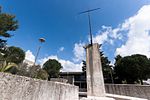Magliana

The Magliana (Italian pronunciation: [maʎˈʎaːna]) is an urban zone of Rome, known as 15E of Municipio XI of Rome. It also the name of a neighborhood or ward of the city. Geographically, it is located on the southwest periphery of Rome, Italy along the Tiber River. The neighborhood dates back to the mid-1900s and is home to a diverse group of people of all ages and ethnicities. About 40,000 people reside in Magliana; housing is made up of mostly owner-occupied apartments in 7–8 story apartment buildings. The space is home to a good deal of economic activity that stretches from the main street, Via Della Magliana in the northwest of the neighborhood, to the southeast towards the Tiber River. However, businesses, activity, and buildings taper off as the neighborhood nears the river bank. Finally, between the built neighborhood and the river is a running trail along an area of farmland. The neighborhood is confined by the Tiber on the east and Railroad tracks on the west edge. In the center of Magliana there are two main areas of congregation: Piazza Fabrizio De Andre and the Mercato Magliana (Magliana Market). The Piazza Fabrizio De Andre is consistently filled with people; in the morning the older generation can be seen sitting on the many benches or strolling through. In the afternoon through early evening it is usually filled with more than 60 children playing on the playground equipment. The Mercato Magliana is open in the morning and early afternoon and offers a wide variety of goods at discount prices.
Excerpt from the Wikipedia article Magliana (License: CC BY-SA 3.0, Authors, Images).Magliana
Viale Alessandro Marchetti, Rome Magliana Vecchia
Geographical coordinates (GPS) Address Nearby Places Show on map
Geographical coordinates (GPS)
| Latitude | Longitude |
|---|---|
| N 41.831111111111 ° | E 12.401666666667 ° |
Address
Viale Alessandro Marchetti
Viale Alessandro Marchetti
00148 Rome, Magliana Vecchia
Lazio, Italy
Open on Google Maps






